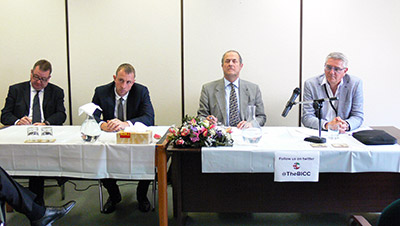
UK Trade and Investment Briefing on Iran
UK Trade and Investment Briefing on Iran
A Talk by Campbell Keir, Director Energy and Infrastructure, UKTI and Matt Lister and Kevin Ringham of the Frontiers Markets Iran team at UKTI.
Held at The British-Iranian Chamber of Commerce, 15th July, 2016

BICC hosted a meeting on 15 July with guest speaker Campbell Keir, Director Energy and Infrastructure, UKTI and Matt Lister and Kevin Ringham of the Frontiers Markets Iran team at UKTI.
The UKTI team briefed members on latest developments in UKTI and the UK Government’s promotion of trade with Iran. Mr Keir commented on the substantial growth opportunities in Iran and the interest of the Iranian government in fostering foreign direct investment, especially in infrastructural items including rail and renewable energy projects as well as investment in the national air fleet. The government had recently hosted a visit by Iran’s energy minister Hamid Chitchian, one of only two cabinet ministers to visit Britain in the past ten years. During the Minister’s visit he met with then Secretary of state for Energy, Amber Rudd MP and Rory Stewart, MP , Minister for Water and signed a Memorandum of Understanding with the Department of Energy. A further MOU on solar energy was signed during the visit.
The UK government has also taken steps to support an increase in trade with Iran by means of a memorandum of understanding signed between UK Export Finance and its Iranian counterpart which will provide cover for exports to Iran denominated in Sterling and Euros on a case-by-case basis. £50 million pounds is being made available by the government to professional services companies assisting Iranian banks to upgrade their compliance systems.
Both the Iranian and UK governments are working on the process of upgrading diplomatic representation from Charge d’Affaires to full Ambassador, but this will take some time. The UKTI office in Tehran is , however , increasing its headcount. Demand in Iran for visas for travel to the UK is higher than can currently be accommodated, but the single biggest challenge to trade with Iran remains the difficulty of conducting transactions through the banking system. Many of the largest banks remain the most reluctant to facilitate trade with Iran. However, some small banks which do not have US banking licences are more willing to facilitate transactions with Iran.
Mr Keir reported some apparent softening of the US stance as a result of statements made by the acting Director of OFAC, John Smith who has indicated that provided British companies conduct reasonable due diligence and do not involve American citizens in their trade with Iran, OFAC will not be seeking to penalise them. During the question and answer session, members wondered whether OFAC was adequately staffed up to respond to enquiries by British Companies wanting to clarify sanctions-related issues. UKTI confirmed that, in the event of difficulties in getting responses from OFAC, members of the Chamber should copy their requests for advice to UKTI which would request a response. Companies operating the in oil and gas sector continue to show high levels of interest in the Iranian market and Mr Keir explained that large opportunities remained some way off and there would be less emphasis on oil exploration in the near future.
The Iranian government was focusing at present on smaller opportunities involving the refurbishment and maintenance of oil facilities with the aim of boosting oil production. This would present early opportunities for SMEs in that sector, but it was also worth noting that Iran had developed a series of indigenous technologies in the years of sanctions and British companies would need to be sensitive towards Iran’s own capabilities in this area. It was likely that the Iranian government would favour foreign direct investment and Joint ventures based in Iran and it was probable that British Companies would be expected to bring project finance with them as they enter the market in Iran.
The content of this talk does not necessarily express the views of The British Iranian Chamber of Commerce. The views and opinions expressed are those of the speakers.